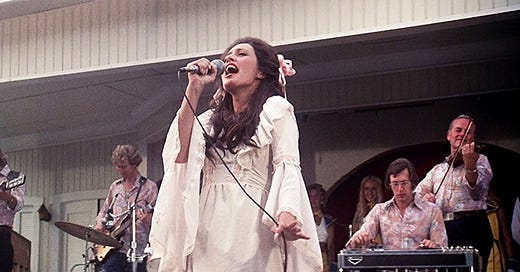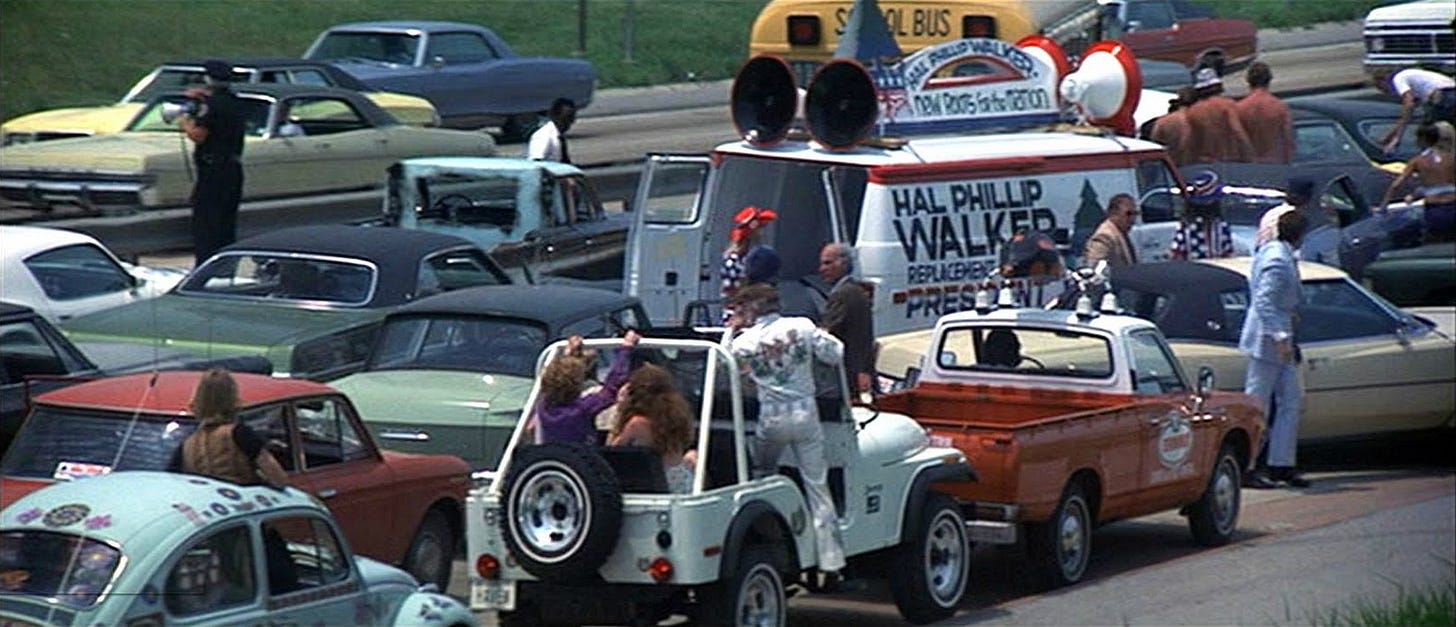America, as told by Cinema #3: 'Nashville'
Robert Altman's most ambitious film is not just about country music but America's idolatry and populism in the face of our declining collective hubris.
For the third installment of America, as told by Cinema we’re going to talk about Nashville (1975), Robert Altman’s ambitious and sprawling cautionary tale of America’s populist obsession with celebrities. Each week I will write about one movie that perfectly encapsulates the American experience in some way, regardless of scope or intent. You can follow the Letterboxd list I’m working off of here. Feel free to suggest more movies— there’s a lot I have yet to see, surely!
Many would contend that the 1960s were the most pivotal time in postwar United States history, but I contend that it was actually the 1970s. Sure, the 60s had Vietnam, hippies, the civil rights movement, two Kennedy assassinations, a man on the moon and a renewed interest in Marxism ideology, but the real fallout came in the 1970s. Despite all the strife evident around the country, the belief in our goals and trust in our institutions was still generally positive. But things were just bubbling below the surface, gathering in the collective conscience, and then in the 1970s the facade crumbled. Nixon promised an era of recompense and a return to tradition. Then Watergate happened. Embroiled in the biggest scandal to date in presidential history, not only Nixon’s career and legacy was ruined; it was the proverbial straw that broke the camel’s back for the public’s faith in American leadership.
All this set the scene for a turbulent and humbling decade. Ineffective public servants, the rise of staunch conservatism, oil crises, inflation and a widening gap between the country’s upper and lower classes kicked off an era of social decay that the country still hasn’t recovered from. Many who were alive at the time consider the 1960s the last great American decade; in the 1970s, the veil came off.
This is the environment which existed when Robert Altman’s most ambitious film, 1975’s Nashville, was released, wedged in the middle of a post-Watergate and pre-Reagan America. Things were bad— anyone could see that— but there was still some hope for recovery, though some clairvoyant minds saw the writing on the wall. Both sides of the American sentiment are on full display in Nashville, a film about the country music industry in all its greed, ambition and cultural positioning, backdropped by a disquieting, openly corrupt political machine throughout the film’s nearly three-hour run time. The movie loosely revolves around the return of Barbara Jean, Nashville’s biggest star, from an undisclosed illness (most likely a nervous breakdown), but the ambient dialogue and complex threaded stories of over twenty characters is constantly interrupted by the obnoxious campaign of Hal Phillip Walker, a “replacement party” candidate in the 1976 presidential election. His operatives drive around town in a painted van with megaphones strapped to the top, endlessly blaring Walker’s speeches— usually folksy and chock full of trite Americana phrases— like a loud fly buzzing around a small room. His staff is in Nashville trying to recruit the apolitical Barbara Jean to sing at one of his campaign events. It’s unclear exactly what Walker’s campaign is supposed to represent in the context of modern American politics, but his cult-like supporters coupled with the music industry’s soulless exploitation of Barbara Jean speaks to the increasing populism rampant in American culture, and the way cultural icons of the time transcended into demigod-like celebrities, an unhealthy growth on the American conscience. Walker (who is never actually seen in the movie) asks for attention and is well aware of his aims, but the real victim here is Barbara Jean, who is not well and being pulled in a million different directions, all with real cultural and personal ramifications. As viewers, we watch her brittle mind and body grapple with issues, the weight of which should not be levied on any unwilling participant. It’s just another way that Altman shows us how unfairly we treat celebrities and the unrealistic expectations we have for them.
If the seedy underbelly of American fame isn’t enough to demoralize us, we also get to see what happens to those less talented than Barbara Jean. Sueleen Gay is a gorgeous and enterprising young waitress in Nashville with dreams of stardom. But she can’t sing at all, and she doesn’t know. Her performance at an open-mic night leads her into what she thinks is a singing role at a political fundraiser for Walker, but in reality it’s a thinly-cloaked excuse for a striptease, which she doesn’t want to do. When one of her only supporters and friends tries to get her to leave town, she refuses, hoping to sing at the big gala with Barbara Jean.
The exploitation of Sueleen gets her a slot in the gala at Nashville’s Parthenon, but it’s too good to be true. Before she takes the stage— in the movie’s climax— Barbara Jean is shot while giving her performance by Kenny (a character the movie subtly follows through its entirety,) a mysterious outsider who comes to town with a gun in a violin case and carries it around with him until he shoots Barbara Jean. It’s a tragic, chaotic and confusing moment in several ways. First, it’s assumed for most of the movie that his ill thoughts are harbored toward Hal Phillip Walker and governmental corruption. Second, Barbara Jean is the most quiet and unassuming character in the entire Nashville scene (aside from her singing talent.) So why did Kenny shoot her? Was he emotionally motivated by Barbara singing at a rally for a politician? Was he angry at celebrity culture and needed a scapegoat? Or, conversely, was he obsessed and jealous of celebrities and all their acolytes, and wanted to make a name for himself too? Or was he simply confused at the messiness and dysfunction of it all, and had a mental break? Much like in real life, the concrete reason is less important than the possible reasons and the earthly implications. A storm of hatred and jealousy and helplessness and confusion in the shadows of a society built to make men fail makes people do crazy things. Several years later, when John Lennon was gunned down by a crazed fan, a Washington Post reporter wrote Robert Altman a letter and asked if he felt guilty, implying that Nashville’s climax caused the murder. His response was, “Well, I don't feel responsible… but don't you feel responsible for not heeding my warning?”
More grotesque than the assassination in Nashville’s final scene, though, is the immediate response. This is a society so desensitized to violence and fanaticism that the terror and frenzy in the crowd is but temporary. “This isn’t Dallas!” yells Haven Hamilton, the de-facto face of Nashville country music with his own political aspirations, in a desperate attempt to save his public image and not be coupled with other American tragedies. While he tries to grasp onto an image of America that no longer exists, the crowd quickly comes to terms with the devastating facts of reality, singing “It Don’t Worry Me” along with Winifred, a fringe wannabe star taking advantage of her big moment in the face of chaos. Much like Winnifred’s will to become famous— which is so strong she’s willing to forget about a cold-blooded murder that she just watched— the crowd accepts the macabre state of American culture with shocking ease. At movie’s end, we’re left with great songs and a genuine love of southern music and culture, but also the gut-wrenching, horrifying realization: how quick we are to accept a doomed and twisted fate, a Kafkaesque attitude latent in the American people that grows only out of the desire to stay grounded in a world that yearns to destroy our sanity. At least we have the music.




